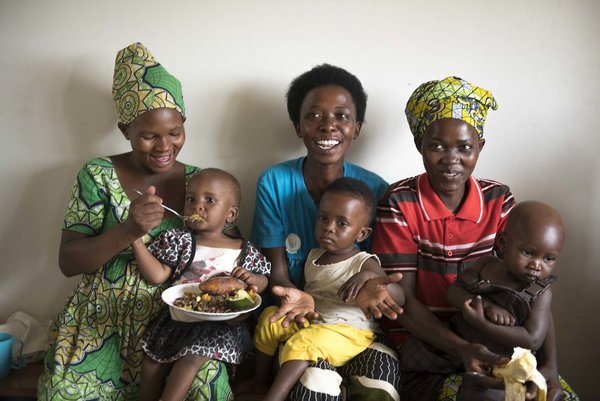- Share this article
- Subscribe to our newsletter
Bio-fortified sweet potato to improve nutrition in baby’s food
Scientists at the International Potato Center (CIP) in Lima/Peru have welcomed a study by researchers of the French Agricultural Research Centre for International Development (CIRAD) in Montpellier/France, supporting the commercial processing of bio-fortified orange-fleshed sweet potato (OFSP). The study Bioaccessibility of Biofortified Sweet Potato Carotenoids in Baby Food: Impact of Manufacturing Process – published in the prestigious Frontiers in Nutrition journal – approves the formulation of orange-fleshed sweet potato proposed in tested samples, which also incorporates pumpkin, oil and egg yolk, as a way of improving the overall safety and quality of the baby-food product.
In particular, the researchers noted that the formula would maximise carotenoid bio-accessibility of the food which facilitates the absorption of vitamin A. The samples underwent industrial heat processing mainly pasteurisation and sterilisation.
CIP promotes the incorporation of OFSP puree into baby food
A research-for-development organisation with a focus on potato, sweet potato and Andean roots and tubers, CIP delivers innovative science-based solutions to enhance access to affordable nutritious food, foster inclusive sustainable business and employment growth, and drive the climate resilience of root and tuber agri-food systems. By 2023, CIP expects to have reached more than 15 million households – an additional 10 million – with improved nutritious foods. Research by external parties further strengthens CIP’s approach in generating demand for orange-fleshed sweet potato products.
In working with rural communities most at risk from vitamin A deficiency in Africa and Asia, CIP supports World Health Organization (WHO) recommendations for exclusive breast feeding for infants up to six months of age. CIP recommends the incorporation of OFSP puree into baby food during complementary feeding. This is done as part of an integrated agriculture-nutrition-health-education-and-marketing approach to promote bio-fortified OFSP among vulnerable households.
Implementation of OFSP puree processing plants in Africa
A number of OFSP puree processing factories are being established in African countries, such as in Kenya, to supply other entities such as bakeries, hotels and baby food manufacturers. These entities are using OFSP puree as an ingredient in their products, thereby not only manufacturing healthier foods but also generating demand for the crop. In some instances, such as in making bread, this approach has also lowered production costs thanks to less use of imported wheat.
“The principal goal of promoting the use of OFSP puree by food manufacturers is to catalyse new value chains for the crop, and encourage more farmers to grow it and more families to eat the nutritious OFSP roots,” says Dr Tawanda Muzhingi, CIP’s regional food scientist and nutritional biochemist, based in Kenya.
“Our research also focuses on the sensory acceptability – appearance, aroma, texture, taste and general acceptability – and the nutritional content of an increasing range of sweet potato products in different markets and dietary contexts,” notes Hugo Campos, CIP’s Director for Research.
(CIP/wi)
Reference:
Claudie Dhuique-Mayer et al. (2018). Bioaccessibility of Biofortified Sweet Potato Carotenoids in Baby Food: Impact of Manufacturing Process; in: Frontiers in Nutrition





Add a comment
Be the First to Comment